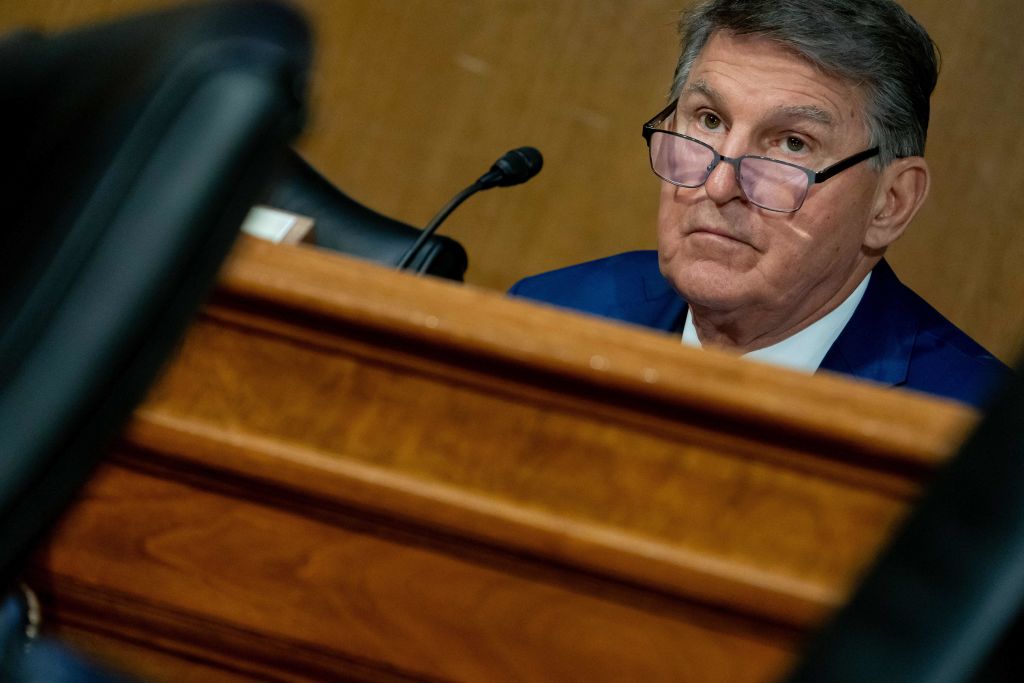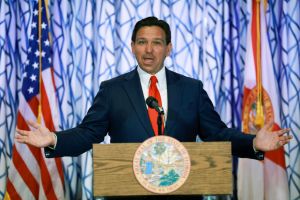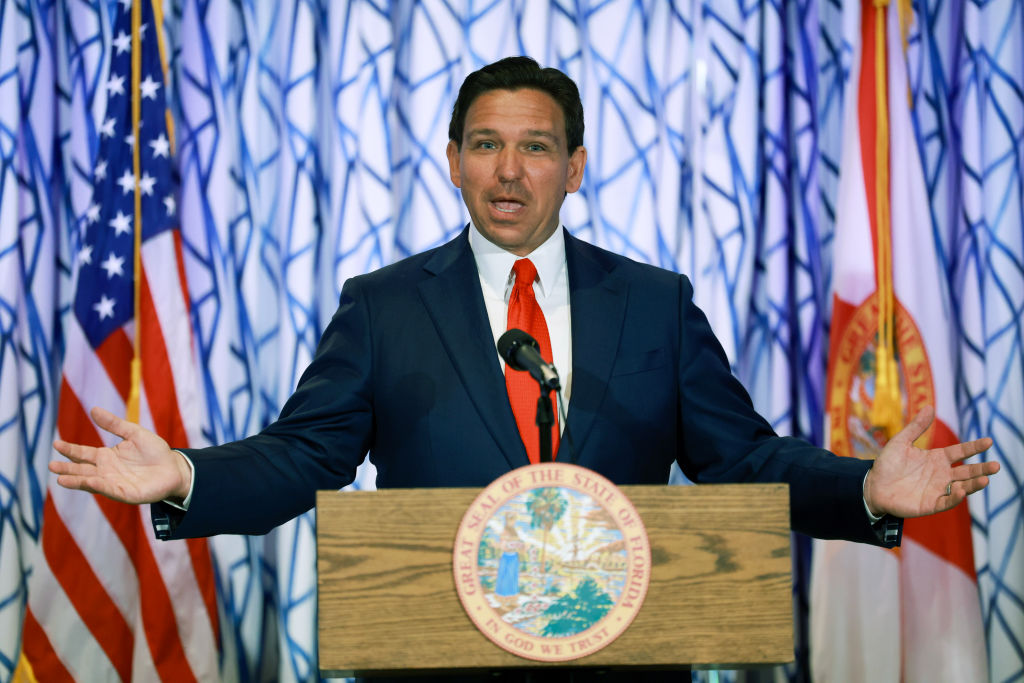Welcome to Thunderdome, where you might think that today would be focused on the off-year election (many lessons on that below) or the debate last night (a few takeaways to be sure), but the breaking news has overtaken all of this: Joe Manchin, the West Virginia senator and former governor, has announced that he will retire rather than run for re-election.
Manchin has been at the focal point of one fight after another in the Senate during his tenure, wavering back and forth between working with Democrats and Republicans depending on the issue. His announcement means Republicans are assured of picking up his seat. But there is also a strong indication to it that he does not consider himself done with politics yet. Here’s his article announcing his decision, which perhaps tellingly ran in the Wall Street Journal:
After months of deliberation and long conversations with family, I believe I have accomplished what I set out to do for West Virginia. I have made one of the toughest decisions of my life and decided that I won’t run for re-election to the Senate. I will finish my term while traveling the country and speaking out to see if there is interest in building a movement to mobilize the middle, find common ground and bring Americans together.
Serving the people of West Virginia as a state legislator, secretary of state, governor and US senator has been the honor of my life. I am proud of having worked every day of the past forty-two years trying to make things better in the Mountain State.
But this moment in the nation’s history is so filled with peril and political dysfunction that I want to work not only for my beloved West Virginia but for all Americans. Working together, I want to eliminate what is standing in the way of so many obvious and popular solutions. While the Democratic and Republican parties increasingly cater to the extremes, most Americans are moderate, levelheaded folks, and they are plain worn out.
We need to reaffirm that country should always come before party, but there are real structural issues to get there. Today, the incentives in politics reward bad behavior and demand party purity at the expense of problem-solving. Too much money flows to too few candidates, who stay so long in their offices they are no longer responsive to the people. We have primaries that limit who can participate and elections that are almost never competitive anymore. Democracy is supposed to give the people a voice, but Citizens United v. FEC, toxic gerrymandering, closed primaries and the lack of term limits are silencing that voice. It’s time to give power to more people and hold our elected officials more accountable.
I know our country isn’t nearly as divided as Washington wants you to believe. We share common values of family, freedom, democracy, dignity and a belief that we can overcome any challenge together. We want leaders who will fight to unite Americans instead of fighting each other. It isn’t too much to ask for.
Does that sound like someone who is about to bow out of politics? No, I didn’t think so. Manchin could well be headed toward one last campaign, one where he could frame himself as a true defender of democracy in a climate of partisanship. Can he win? I believe he can, with the right support. But more than ever, he indicates how much people are dissatisfied with what they hear from Mar-a-Lago and the White House. What does he have to lose by running? It makes a helluva lot of sense.
A substantive debate, but too late?
The decision to grant a debate to NBC in the GOP primary was subject to wide criticism, but the performance last night was surprisingly substantive and interesting. On our Thunderdome podcast today, we go through all the winning and losing moments and discuss the potential outcomes for each candidate, along with the lessons they took from the off-year elections. And compliments to Hugh Hewitt for forcing some serious questions, and potentially changing the tone of some of the questions from his fellow moderators to speak to Republican concerns. Next month’s debate — yes, another one! — will be hosted by NewsNation with Megyn Kelly, Elizabeth Vargas and Eliana Johnson. Oh, the RNC definitely wants eyeballs on these!
Read our Spectator round-up from the spin room here and understand that as much as everyone is clamoring for a DeSantis-Haley-Trump debate, it’s hard to see how that could possibly happen given the former president’s intransigence. He chose instead to do a rally nearby, which was notable for its low energy and an early departing crowd. Trump needs the foils, people! The audience wants to see him lay the smack down, and he can only do so much against Letitia James.
My overall takeaway: nothing changed, which benefits DeSantis and Haley. Both had fine moments throughout the debate, Vivek seemed like he was promoting his podcast, Chris Christie was very one note — and Tim Scott would answer the question then pivot to a different cadence. But he did give us a glimpse at long last of his girlfriend, so there’s that.
The GOP must fight back on abortion
One of the major factors discussed at the debate was the perception of outcomes from the off-year elections in Kentucky, Virginia, Ohio and elsewhere. Nikki Haley had an outsized say on the most prominent issue: abortion, where she believes politicians are lying to Republican voters about the likelihood of passing anything through Congress that achieves their aims. As a practical matter, as we discussed on the podcast, she’s right — but this messaging doesn’t really work on the issue without application. It’s like the liner notes for learning a song.
My own perceptions of the 2023 off-year elections are here. One big test to figure out if anyone knows what they’re talking about when it comes to the Virginia elections is to ask them why Siobhan Dunnavant, a well-connected Republican incumbent, lost her race for the state Senate — a contest that was widely considered to be decisive for Governor Glenn Youngkin’s chance to win the body. Dunnavant is an OB-GYN who supported Youngkin’s well-polling fifteen-week ban proposal, and also had every exception you could imagine (rape, incest, life of the mother, fetal abnormalities and so on). Yet she still lost. Why? Because in the redistricting commission, her seat gained about 17,000 more Biden voters — and she lost by 7,000.
The Youngkin effort to win the state legislature was hampered by the abortion issue, but as I outline, that’s not a new factor for Republicans in a blue state — it’s just one they’ve been able to slough off onto senators and presidential candidates. In Kentucky, talented rising young politician Daniel Cameron fared no better. Against a strong moderate incumbent in Andy Beshear, he underperformed and struggled with a pointed abortion ad about rape in the past month. If two donor-friendly centrist Republicans like Youngkin and Cameron are making a mess of this issue, Republicans can’t blame it on the social conservatives — even though they will.
Peter Thiel is done with democracy
A lengthy piece from Barton Gellman outlines why one of the biggest donors to libertarian and conservative causes and candidates is choosing now to step aside:
Already, he has endured the wrath of Trump. Thiel tried to duck Trump’s calls for a while, but in late April the former president managed to get him on the phone. Trump reminded Thiel that he had backed two of Thiel’s protégés, Blake Masters and J.D. Vance, in their Senate races last year. Thiel had given each of them more than $10 million; now Trump wanted Thiel to give the same to him.
When Thiel declined, Trump “told me that he was very sad, very sad to hear that,” Thiel recounted. “He had expected way more of me. And that’s how the call ended.”
Months later, word got back to Thiel that Trump had called Masters to discourage him from running for Senate again, and had called Thiel a “fucking scumbag.”
Thiel’s hope was that this article would “lock me into not giving any money to Republican politicians in 2024,” he said. “There’s always a chance I might change my mind. But by talking to you, it makes it hard for me to change my mind. My husband doesn’t want me to give them any more money, and he’s right. I know they’re going to be pestering me like crazy. And by talking to you, it’s going to lock me out of the cycle for 2024.”
This matters because of Thiel’s unique role in the American political ecosystem. He is the techiest of tech evangelists, the purest distillation of Silicon Valley’s reigning ethos. As such, he has become the embodiment of a strain of thinking that is pronounced — and growing — among tech founders.
And why does he want to cut off politicians? It’s not that they are mediocre as individuals, and therefore incapable of bringing about the kinds of civilization-defining changes a man like him would expect to see. His disappointment runs deeper than that. Their failure to make the world conform to his vision has soured him on the entire enterprise — to the point where he no longer thinks it matters very much who wins the next election.
One more thing
One possibility that political activists should consider, even if they rarely do, is that many voters these days just aren’t down with the Blue team or the Red team. They like government to be divided, and kept it that way in Kentucky and in Virginia, concerned perhaps about what would happen under one party rule. It’s not the sort of thing that appeals to partisan political analysts, but it certainly makes a lot of sense for independent swing voters — who tend to be harder to pin down. If these voters decide in 2024 that they dislike Donald Trump and Joe Biden so intensely that they’d like to try something new, I can’t even begin to imagine the recriminations between the two parties if they are denied an electoral college majority,


























Leave a Reply